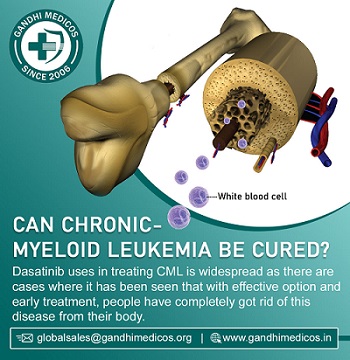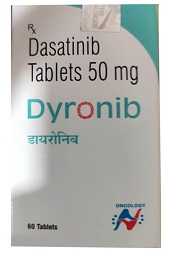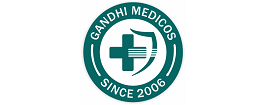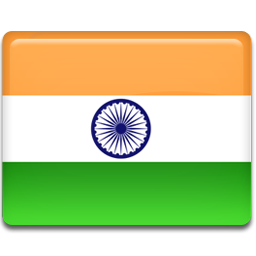Can Chronic Myeloid Leukemia Be Cured?

Dyronib 50 mg Tablet
 Treatment of chronic myeloid leukemia depends on several factors, such as the person’s age, the disease’s phase, different prognostic factors and health conditions etc. Modern treatment options and drugs make it possible to control and live longer life for people with CML.
Treatment of chronic myeloid leukemia depends on several factors, such as the person’s age, the disease’s phase, different prognostic factors and health conditions etc. Modern treatment options and drugs make it possible to control and live longer life for people with CML.
Dyronib 50 mg Tablet (Dasatinib) uses in treating CML is widespread as there are cases where it has been seen that with effective options and early treatment, people have completely got rid of this disease from their body.
Dyronib 50 mg Tablet is a tablet your doctor will recommend if the bone marrow and blood tests show that the tests are not working on your body. Your physician may recommend a combination of all the targeted drugs. A combination of high-dose dasatinib, imatinib, and nilotinib will be recommended for people who do not respond to the normal dose of 1 TKI. If the CML has progressed to an advanced stage, chemotherapy is the effective treatment option. Chemotherapy includes taking drugs that help to kill abnormal cancerous cells. Targeted drugs are first prescribed since they have fewer side effects than chemotherapy injections.
However, chemotherapy becomes a good option if the tablets do not work or provide good results. Side effects of chemotherapy are more severe compared to targeted drugs. Bone marrow or stem cell transplant is a potential cure for CML; however, it is an intensive treatment and may not be suitable for everyone. In this type of transplant, donated cells, known as stem cells, are transported into the patient’s body to produce healthy white blood cells.
Chronic phase
Chronic phase leukemia can be treated with the help of TKIs such as Dyronib 50 mg Tablet (Dasatinib tablets). If the first dose of the drug doesn’t work, then your physician will increase the dose or prescribe another TKI. In rare circumstances, chronic myeloid leukemia patients suggest an allogeneic stem cell transplant.
Monitoring treatment
Doctors monitor the patient’s health condition to know how they respond to the treatment and check their blood counts frequently. PCR or polymerase chain reaction heads in measuring the amount of BCR-ABL gene in blood. Testing for BCR-ABL, along with a bone marrow test for the presence of the Philadelphia chromosome, is done within three months after starting TKI. Treatment results will show how the person is responding to the current drug. If the results show that the treatment isn’t working for the patient, then a new treatment or drug option will be prescribed by your doctor.
Accelerated phase

In the accelerated stage of CML, leukemia builds within the body quickly and causes symptoms. The right treatment option in the accelerated stage of CML depends on the treatment the patient receives.
In this stage, patients are prescribed TKI, and most respond to treatment when given these drugs. Dyronib 50 mg Tablet is a new drug often used in the accelerated phase. CML cells are also tested to check whether gene mutations occur in the body. Interferon is another effective treatment option. Many patients having CML are offered chemotherapy along with TKI. Allogeneic stem cell transplant is the best option for healthy and young patients.
Blast phase
The blast phase of CML is when the leukemia cells become abnormal, and this disease functions similarly to acute leukemia. The symptoms start getting worse, and blood counts become higher. High-dose imatinib is suggested for people having blast phase CML.
TKI drugs help in the treatment option for people having blast phase CML. Palliative treatment is significant since most patients with blast phase CML cannot be treated and cured completely. Radiation therapy may help reduce pain or shrink the enlarged spleen from the area damaged by leukemia cells. Chemotherapy can also help in relieving the symptoms.


 Anti Cancer Drugs
Anti Cancer Drugs Hepatitis C
Hepatitis C Meds for HIV
Meds for HIV Ayurvedic Medicine
Ayurvedic Medicine Transplant Medicine
Transplant Medicine Respiratory System
Respiratory System +91-9999064250/ 9811604424/ 9811604444
+91-9999064250/ 9811604424/ 9811604444  8(800)100-47-90
8(800)100-47-90
